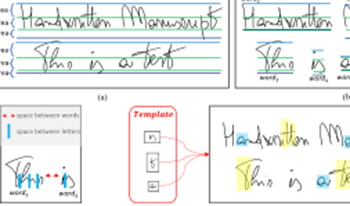
Forensic handwriting examination is a branch of Forensic Science that aims to examine handwritten documents in order to properly define or hypothesize the manuscript’s author. These analysis involves comparing two or more (digitized) documents through a comprehensive comparison of intrinsic local and global features. If a correlation exists and specific best practices are satisfied, then it will be possible to affirm that the documents under analysis were written by the same individual. The need to create sophisticated tools capable of extracting and comparing significant features has led to the development of cutting-edge software with almost entirely automated processes, improving the forensic examination of handwriting and achieving increasingly objective evaluations. This is made possible by algorithmic solutions based on purely mathematical concepts. Machine Learning and Deep Learning models trained with specific datasets could turn out to be the key elements to best solve the task at hand. In this paper, we proposed a new and challenging dataset consisting of two subsets: the first consists of 21 documents written either by the classic “pen and paper” approach (and later digitized) and directly acquired on common devices such as tablets; the second consists of 362 handwritten manuscripts by 124 different people, acquired following a specific pipeline. Our study pioneered a comparison between traditionally handwritten documents and those produced with digital tools (e.g., tablets). Preliminary results on the proposed datasets show that 90% classification accuracy can be achieved on the first subset (documents written on both paper and pen and later digitized and on tablets) and 96% on the second portion of the data. The datasets are available at https://iplab.dmi.unict.it/mfs/forensichandwriting-analysis/novel-dataset-2023/.
Eleonora Breci, Luca Guarnera, Sebastiano Battiato, "A Novel Dataset for Non-destructive Inspection of Handwritten Documents" in Electronic Imaging, 2024, pp 341-1 - 341-6, https://doi.org/10.2352/EI.2024.36.4.MWSF-341
 Find this author on Google Scholar
Find this author on Google Scholar Find this author on PubMed
Find this author on PubMed